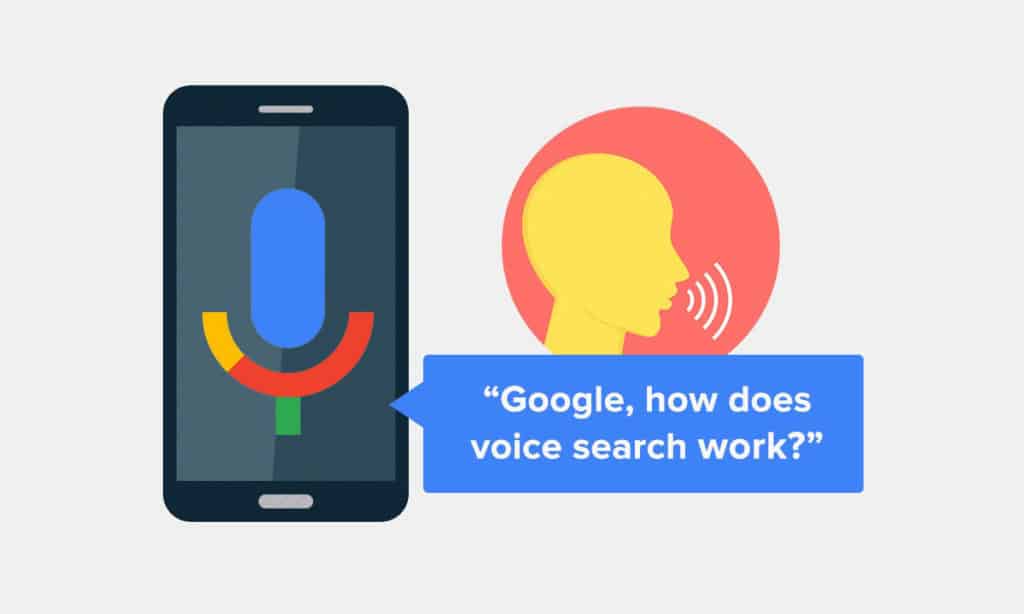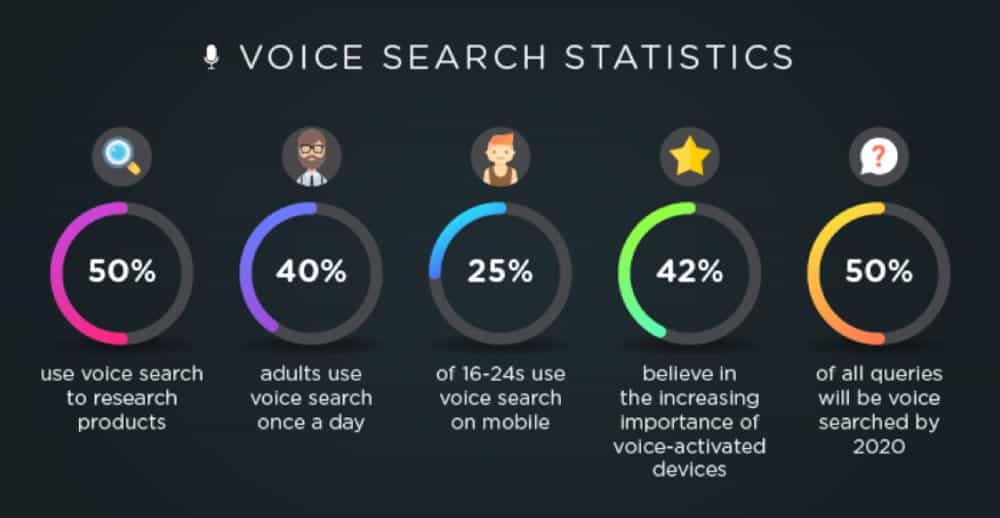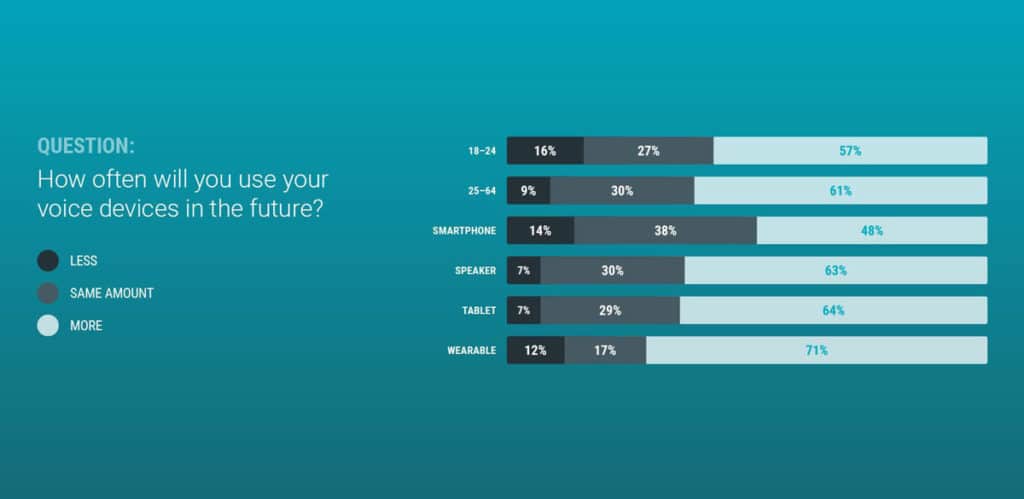
28 Apr What Is Voice Search and Why Is it Important for Business?
What Is Voice Search and Why Is it Important for Business?
Are you elbow deep into the cake batter, but need to find out the next step? Are you driving, but need to search Google for the nearest gas station? Or have you got your hands full of a crying toddler, and want to play cartoons on YouTube? Whatever your need, voice search has got your back.
In the last decade, Voice Searching has come to the forefront through Amazon’s Alexa and Google’s ‘Okay, Google.’
Gone are the days when voice search was a frustrating experience, today consumers prefer voice searching over text search.
Research shows that voice-enabled devices experienced a 200% growth in 2019, and this trend has continued into 2020.
As more and more consumers search the internet through voice commands, businesses must adopt a voice search optimisation strategy to remain competitive.
In this article, we will discuss voice search, its rising popularity, and implications for businesses in 2020.
What is Voice Search?
Voice search or voice-enabled technology is an invention that combines voice recognition with search engine queries. In voice searching, users speak their questions rather than type them. It saves time, energy, and enables you to multitask.
Voice search and voice-enabled devices are becoming increasingly popular; all modern appliances such as a fridge, oven, and even a tap are voice-enabled. Similarly, office supplies such as printers, copiers, and scanners are voice-enabled for greater efficiency. Consumer technologies such as smartphones, speakers, tablets, and virtual-assistants are all voice-enabled.
As consumers have shown their preference for voice-enabled devices, more and more companies will keep producing products that allow users to use voice commands to access their functions.
It is expected that by the end of 2020, 50% of all consumer searches will be through voice-enabled devices.
How does Voice Search Work?

In voice searching, a system understands spoken word and acts on it. For example, instead of typing, you say Okay, Google finds the nearest restaurant near me, and Google runs the query on its search engine to present you the results.
Some people confuse voice search with virtual assistants; while they are related, they are not the same.
Voice searching is a fundamental technology that can be used in multiple other technologies, including virtual-assistants. Virtual assistants like Amazon Alexa and Google Home use voice search technology to perform their functions.
Why Is It Gaining Popularity?
The most prominent reason for the increased notoriety of voice search technology are:
Voice Searches have Become Better
Advancing research in Artificial Intelligence has improved the ability of machines to recognise natural languages, which has contributed to the sophistication of voice search technology.
We all, especially 90’s kids, remember the time when voice searches resulted in hilarious outcomes as the system misunderstood us. Today, voice search is almost 80% accurate, and its accuracy is improving every day.
Voice Searches are Fast and Easy
Voice command is faster than opening an app or a website and typing. It is easier to use when you are multitasking, and your hands are busy; you can use it while driving, cooking, and even bathing.
Voice Search is Convenient
A world where no one has enough time, convenience is the key to a consumer’s heart. Voice-search saves you time and effort, and that makes it invaluable.
Voice Search is Mobile-Friendly
Smartphone users drive search; 56% of all voice commands come from smartphones. It is more comfortable, fast, and convenient to voice search on smart devices.
Voice Search is Fun
Siri’s quips to user queries seemed like a fun but sidebar event. However, unprecedentedly, it has become a phenomenon.
Consumer research shows that a large chunk of people spend time on voice search as they would on a hobby. They enjoy searching, asking questions, or holding conversations through voice search.
Where is it Used?

Improving accuracy and rising consumer demand are pushing voice search into the mainstream as every industry fast-tracks its integration into their products.
The existing applications of voice search technology include:
Virtual-Assistants & Smart Speakers
One in 4 Americans owns a smart speaker. Amazon Echo, Google Home, Apple HomePod, and Lenovo Smart Display are examples of smart speakers that listen for voice commands and present the results.
These speakers are very popular with consumers; you can ask for any information using them with just your voice. Consumers use them for:
- Making phone calls and sending text messages
- Carrying our search engine queries
- Obtaining director assistance, especially local searches
- Launching programs or applications
- Searching for files in the system
- Asking questions for ‘fun.’
Customer Services
Technology is making it easier for services to provide better customer service online. Voice-enabled catboats help consumers find information and solve their queries in a conversational style.
E-Commerce
Search has made online shopping very easy; users simply speak the name of the product they want, and they will be directed to it.
Education
Search is helping increase the accessibility of online education platforms; teachers can now make audio/video lessons, and students can access them easily.
Security
Security and search technologies are increasing consumer safety. The banking and finance sector are using it for biometric verification of identity to decrease theft and security breaches.
Maintaining Records
Records that require meticulous filing systems such as healthcare and law are using voice search to make the filing process more efficient.
Selection and Acquisition
Selection and Acquisition are relying on voice search to scour through multiple databases for potential employees. Although the conventional search was effective, voice-search has sped the process up, making it more convenient.
Why Does Your Business Need Voice Search?

Modern Businesses need Voice Search for three main reasons:
- It Saves Time & Increase Business Efficiency
- Consumers Love It
- SEO of Voice Search Content is Necessary
1 – It Saves Time & Increase Business Efficiency
The applications of voice-search technology in the above section must have shown you how businesses can use voice-search to enhance consumer experience and gain business efficiencies to improve their bottom line.
Here are a few examples:
- Enhances consumer experience by providing customised and valuable services. If you have voice-search, your users can get any information they want from your website at any time. Voice-search has a more conversational style which users prefer; it’s like talking to another person.
- Increases Local Business: local businesses have a chance to attract more consumers as people search locally. Small businesses can benefit from this, particularly. For example, companies like Carpet Cleaning London can focus on their voice optimisation strategy to appear in search of local users.
- Streamlines Business Operations by helping perform routine tasks more conveniently
- Opens door for innovations: businesses can come up with new ideas to facilitate their consumers, such as increased security through biometric voice recognition, etc.
2 – Consumers Love It
Once more, voice-search is essential to your business because it has gained immense popularity with consumers.
More and more people are using it each day, which increases the demand for voice-enabled devices.
Some reliable statistics that show the importance of voice-enabled technology are:
- In 2020, 32% of all users prefer to use voice search over traditional search
- By the end of 2020, voice search is expected to grow to 50% of all research queries
- An average of 43% users shop online through voice-enabled devices
- More than 58% of users use voice search to find local businesses.
- 1 in 4 people in Americans own one or more smart speaker devices
- Globally, 200 million people use smart speakers
3 – SEO of Voice Search Content is Necessary

Finally, and most importantly, businesses need to develop an optimisation strategy for voice search content; otherwise, they will be left behind by their competition.
To rank on the Google search engine, optimised content is necessary, and that cannot happen unless businesses are ‘voice ready.’
Voice Search is different from text search, and therefore it requires a different SEO strategy. SEO experts point out the following distinctions:
- Voice Search is Precise: it takes time to ask a full question on google, whereas it takes a few seconds to speak it. Therefore, voice search queries are precise and to the point. For example, if users wanted to know where the best-smoked fish in tow is, they would type ‘best fish. Name of place.’ But in voice search, they ask, ‘Okay, Google tell me where I can find the best-smoked fish at 7:30 in the name of the location.’
- Voice Search is more local than traditional search: a significant chunk of voice search queries contain ‘near me’ questions.
As you can see, optimising voice search data would require you to focus on local and long-tailed keywords, among other strategies.
You can see that the approach is mandatory; otherwise, you will no longer rank on Google, and your business will suffer.
Wrapping it up – Voice Search and the Bottom Line
Voice search and voice-enabled devices will soon be everywhere. As consumers become more used to technology, all search queries will shift from text to voice.
A shift to voice search will affect the business positively as well negatively; companies could use the new technology to enhance user experience and gain loyal customers.
They can also suffer if they don’t change their optimisation strategy to match the growing voice search content.
Businesses must prepare themselves and become voice ready to not only survive but succeed in that voice-first world.



